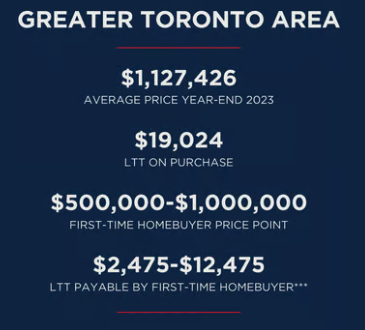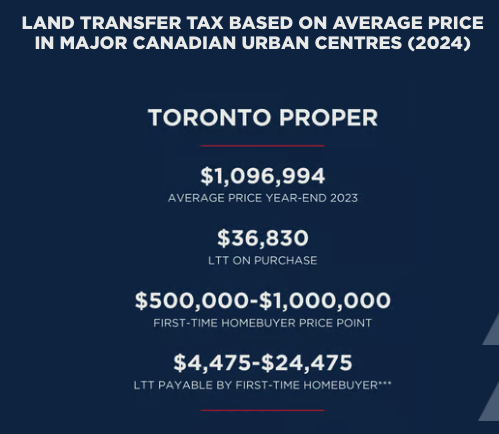High housing values, interest rates and taxes contributing to post-pandemic exodus from Canada's most expensive provinces.
While land transfer taxes and new property assessments in key markets appear to have little effect on the surface, eroding affordability levels are slowly shifting migration patterns and changing the landscape in major Canadian centres.
While land transfer taxes and new property assessments in key markets appear to have little effect on the surface, eroding affordability levels are slowly shifting migration patterns and changing the landscape in major Canadian centres.
LAND TRANSFER TAX BASED ON AVERAGE PRICE IN MAJOR CANADIAN URBAN CENTRES (2024)
In an analysis of six major housing markets including Vancouver, Calgary, Winnipeg, Toronto, Montreal and Halifax, RE/MAX found governments at all levels are collecting billions from Canadian homebuyers through levies and development fees on new construction, as well as land transfer and property taxes on residential properties. Tax rate increases, in tandem with record-high housing values and mortgage rates, have sparked a post-pandemic exodus from the country’s most expensive markets, contributing to a significant uptick in interprovincial migration numbers in Alberta and Atlantic Canada in 2023. While some homebuyers were content to move outside of core markets within their province, close to 60,000 Canadians found their answer to the current housing crisis in Alberta and, to a lesser extent, Nova Scotia, New Brunswick and Prince Edward Island. According to Statistics Canada’s Quarterly Demographic Estimates, Provinces and Territories Interactive Map, interprovincial migration doubled over already-strong year-ago levels in the first three quarters of 2023 in Alberta, with the province welcoming 45,194 people, compared to 22,278 during the same period in 2022.
Regressive tax policies are a reason for the changing migration patterns. Land transfer taxes were introduced across Canada in the 1970s as a method of generating revenue for municipalities, regardless of income. The highest land transfer taxes are found in Toronto, where buyers pay a municipal land transfer tax as well as a provincial tax. On January 1, 2024, Toronto upped the ante, introducing a luxury tax on home sales over $3 million. While the existing municipal land transfer tax (MLTT) essentially remains the same under $3 million, homebuyers that cross the threshold will find a sliding scale of taxes that range from 3.5 per cent on sales over $3 million to 7.5 per cent on sales over $20 million. On an average-priced home in the city, buyers can expect to pay close to $40,000 in taxes.
“When you think about what a $40,000 tax bill payable upon closing could do if it was applied to a down payment, it’s clearly time to incentivize the first domino,” says Alexander. “The first order of business should be revisiting the first-time buyer rebate/exemption in Toronto and Vancouver, because at $400,000 and $500,000-$525,000 respectively, they’re woefully inadequate given the average or benchmark price of properties in those cities.”
Young Canadians in particular are being impacted by taxes and this is having an impact on their home-buying decisions. A recent RE/MAX survey revealed that 40 per cent of Gen Z and 35 per cent of Millennials agree that the land transfer tax has played a role in their pursuit of home ownership, compared to 26 per cent of Gen X and 21 per cent of Baby Boomers.* As a result, there is a growing wave of younger people who are choosing to leave major centres and provinces to attain home ownership. Not surprisingly, some of the fastest-growing municipalities are inside or close to urban areas, according to Statistics Canada 2021 Census.
For example, East Gwillimbury in the Greater Toronto Area experienced the greatest increase in population between 2016 and 2021 with a 44.4-per-cent uptick; Langford, outside of Victoria, BC, and Southern Gulf Islands just outside Vancouver, were up 31.8 and 28.9 per cent respectively; Niverville, on the outskirts of Winnipeg was up 29 per cent; Carignan just outside Montreal was up 24.1 per cent; while Wolfville, Nova Scotia was up 20.5 per cent. New and proposed property tax reassessments are also creating confusion in markets across the country, including Toronto, Montreal and Halifax, with some properties assessed above recent sale prices. The Province of Ontario has yet again postponed its reassessment. With the Municipal Property Assessment Corporation (MPAC) still operating at levels assessed in 2016, new assessments in the province for the years 2023 and 2024 will likely be significantly higher when distributed.
The burden is even higher on new home construction within Canada’s most expensive markets. In Toronto, for example, taxes, levies and development fees on new condominiums – the first step to home ownership for many Canadians – is estimated to account for approximately 25 to 30 per cent of the overall purchase price. On a unit priced at $717,000, the average price for a condominium in Toronto at year-end, that accounts for roughly $180,000 to $215,000 paid by the purchaser. New low-rise housing is no exception. Based on a study by Altus Group, the Building Industry and Land Development Association (BILD) found that government fees, taxes and charges added $222,000 to the cost of an average, new single-family home in the Greater Toronto Area (GTA) in 2019 – three times higher than in major U.S. markets such as San Francisco, Miami, Boston, New York City, Chicago, and Houston.
Rising tax levels and quality of life have become a growing concern in cities throughout North America as well. Driven by domestic out-migration, more than 600,000 people left New York State for Florida, Texas, and other low-tax states in 2020 and 2023, according to US Census Data. Internal Revenue Services (IRS) data show the state lost an estimated $45 billion in taxable income between 2020 and 2023. Florida, on the other hand, welcomed more than 700,000 people during the same period, as the state’s favourable tax structure proved irresistible to buyers. “Clearly, public policy is contributing to a myriad of issues – with affordability front and centre – and there’s no relief in sight,” says Alexander. “Shelter is a basic human need, yet accessibility is becoming increasingly problematic as government reliance on the housing sector as a means of funding creates a greater divide. Affordability and opportunity are key to healthy and sustainable real estate market activity and a vibrant economy. As such, the potential economic impact of ongoing out-migration on the future of individual provinces should raise alarm bells.”
GREATER TORONTO AREA
After a flurry of home-buying activity at luxury price points in the final quarter of 2023 in Toronto Proper due to upcoming changes to the city’s 2024 land transfer taxes, the housing market has slowed in the Greater Toronto Area. Sales are currently trending on par or slightly ahead of year-ago levels, with economic concerns and high interest rates leaving many buyers sitting on the sidelines. While the Bank of Canada (BOC) held firm on rates in January for the fourth consecutive time since its July 2023 rate hike, inflation remains high, placing the BOC in a challenging position. That said, there are signs that quantitative tightening is drawing to a close and some economists predict rates will start coming down by mid-year. With the promise of lower rates on the horizon, the spring market is expected to be active, with trade-up buyers leading the charge, cashing in on equity gains realized over the past decade. Unlike years prior, this spring market will be characterized by a greater selection of homes available for sale and less competition in the marketplace.
*Leger online survey of 1,517 Canadians aged 18+ was completed between July 21 and 23, 2023, using Leger’s online panel. Leger’s online panel has approximately 400,000 members nationally and has a retention rate of 90 per cent. A probability sample of the same size would yield a margin of error of +/- 2.5 per cent, 19 times out of 20.
**This report includes data and insights about Canadian housing markets supplied by RE/MAX brokerages and sourced from the Canadian Real Estate Association and local real estate boards. RE/MAX brokers and agents are surveyed on market activity and local developments. Each RE/MAX office is independently owned and operated.







